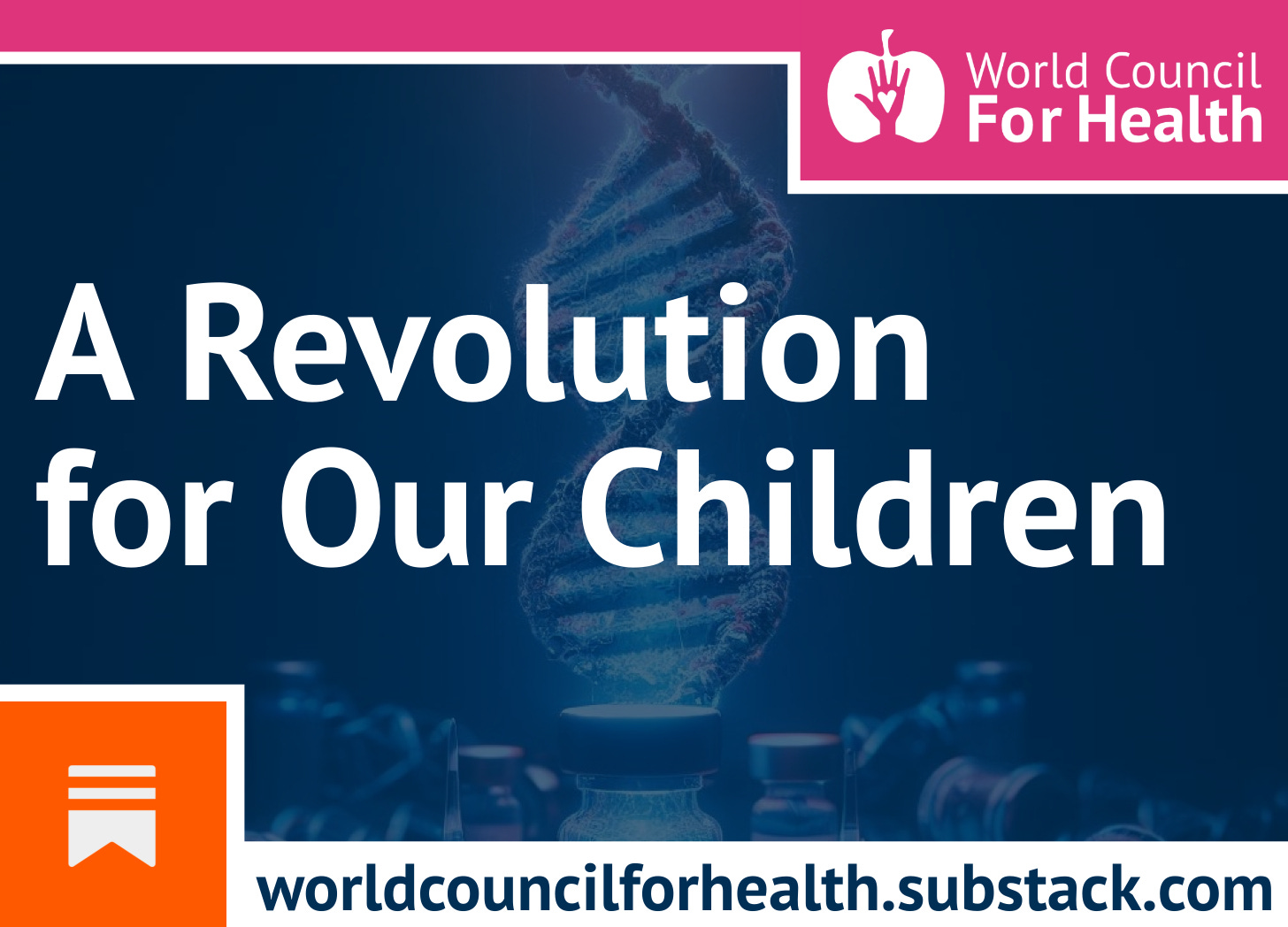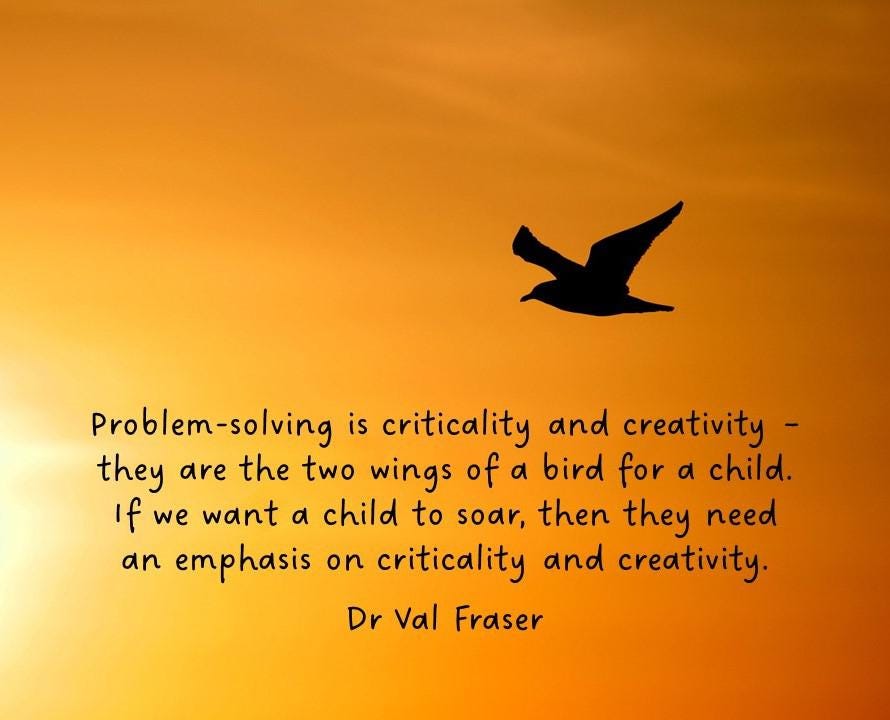A Revolution for Our Children
“We are due a new paradigm shift in parenting – it begins with education and health.” — Dr Val Fraser
Written by World Council for Health Correspondent Alice Ashwell, PhD.
How do we – as parents and members of society – help to raise healthy, happy children who are equipped to handle the uncertainties of our world?
Paediatrician Dr Lawrence Palevsky from the USA and Education Advisor Dr Val Fraser from the UK are passionate advocates for ‘a better way’ in their respective fields. Listening to them riff about their visions for rethinking approaches to the health and education of children and youth was an inspiration.
This World Council for Health Better Way Liveconversation hosted by Linda Rae and Emma Sron on Monday 23 October 2023 was a truly energising experience. If you missed it, you’ll find the recording in the WCH Newsroom.
If this content is important to you, share it!
Raising healthy, happy children
Observing that, during the Covid years, most people chose to ‘trust the experts’ rather than their own critical faculties, Dr Lawrence Palevsky reflected on the significant decline in critical thinking he has witnessed since he honed these skills as a medical student in the 1980s.
Critical thinking has served him well throughout his career, enabling him to search beyond the boundaries of conventional western medicine for root-cause approaches to support children’s health. As a result, today, his integrative practice is not limited to prescribing drugs or administering vaccinations.
Dr Palevsky also doesn’t believe that his goal as a physician should be to suppress a child’s symptoms. Rather, he recognises that symptoms are the body’s way of regaining a state of homeostasis, and that this process needs to be supported rather than suppressed.
He notes that paediatric medicine has become narrowly focused on treating infections, while in fact the common factor underlying most conditions plaguing children today is an inflammatory process. So, like a detective, he looks for contributing factors that can be addressed – from diet and nutrition to medications, pollutants, and stress due to emotional factors.
Both Dr Palevsky and Dr Fraser are deeply concerned about the exponential rise in chronic illnesses in children and young people since the 1980s. Dr Fraser compared the fact that in her first ten years as an English teacher she came across only one child who might have had autism spectrum disorder (ASD); by contrast, during the previous five working days, she had visited seven young people for home-based education assessments, all of whom were diagnosed with ASD.
Dr Palevsky quoted disturbing statistics showing extremely high rates of neurological issues among children in the USA:
Neuro-developmental disabilities – 1 in 5
Autism – 1 in 36
ADD, ADHD, and problems with executive function, focus, and attention – 1 in 10
Children under 5 years with seizures – 1 in 20 (January 2016 data)
While the possible role of childhood vaccinations in this tsunami of neurological damage is highly controversial, it is important to investigate their effects on children’s brains, nervous systems, and immune systems.
Dr Palevsky also flagged electronics and video games, which are not only exposing children to high levels of electromagnetic frequencies (EMFs) but are actually altering brain function and learning capacity and increasing addictions.
Both Dr Palevsky and Dr Fraser agree that a shift in consciousness is urgently needed, so that parents recognise those factors that are harming their children and know how to support optimum health. Dr Palevsky has worked with many families to relieve the factors contributing to illness, resulting in children returning to full health.
Part of this process is empowering the children to become more conscious of how certain foods, for example, make them feel so that they can develop skills to make more positive choices themselves.
It's time to retrieve our critical and creative skills
Dr Palevsky and Dr Fraser are both passionate about critical thinking and creativity. Encouraging children to experiment, ‘learn through doing’, and figure things out for themselves used to be key to both parenting and education. But strangely, this is no longer the case. In fact, Dr Fraser recently consulted the National Curriculum for English Language and found only ONE reference to criticality!
Dr Palevsky is an advocate for what he calls ‘mindful parenting’. An important aspect of this is encouraging children to learn things for themselves rather than filling their brains with information, which seems to have become the predominant approach to learning in recent years.
“I realised that if I looked at the last 20-30 years of watching parenting and the educational system – I started to see that the learning through doing, experimentation, experience, figuring things out had diminished. Most of the frontal cortex where thinking occurs was left out of coming to things on your own, and more of dumping of information was put into place over the past 20-30 years
Parents were parenting in a way that said, I’m going to make sure you know everything. I’m going to give you everything you need to know to live in the world. The educational system said, just remember this stuff – that’s all you need. Critical thinking and experience were taken out.
If we’re going to shift the consciousness in the world, it’s imperative for us as parents to stop dumping our info into children’s brains. Understand the role that play, experience, failure, discomfort play in building a sense of character, sense of knowing that comes from the inside, not regurgitating because someone from the outside just dumped it into our brains.
Mindful parenting is about changing the way we allow children to learn things – actually give them the opportunity to work things out. Stop correcting them and giving them the answers – so they get creative and do their play and have their experiences. So what they end up learning is theirs to own, and not an outside source – not a media, not a govt, not a parent, teacher, state, doctor – but something internally arrived at that nobody can take away.”
Making learning your own is clearly an effective way to nurture the skills of critical thinking and creativity that have been sadly neglected by the education system, which no doubt contributed to society’s compliance with irrational instructions over the past four years.
In the last 30 years, as the fields of health and education have become increasingly ‘corporatised’, it feels like many have lost touch with natural ways of raising healthy, happy children. Forgetting that children have always learned to talk and walk and read naturally in the company of others, we increasingly rely on educational programmes and aids that make these developmental processes synthetic and contrived. But there is a better way.
We can trust the innate nature of brain development and the child’s ability to learn when given the opportunity to explore in a safe environment. In Dr Fraser’s words, “We should be allowing our children to emerge and shine!”
Increasing numbers of parents and young people no longer feel that schools as institutions are meeting their needs, or even offering appropriate programmes.
Many parents are opting to home- educate their children, but this can be a daunting prospect.
If parenting is important to you, please do share this content!
Dr Fraser concluded her interview with a real gift: an outline of the essential components of what she considers a world-class curriculum – one that encourages the development of the child’s creative and intellectual potential.
Broad and balanced, with a variety of learning and assessment outcomes
Provide for development of the child’s creative as well as intellectual potential
Contain opportunities for self-directed learning
Encourage curiosity about world, how it works, and the people in it
Develop skills to be effective in a literate, numerate, and technological society, commensurate with their age and ability
When we look at time in the National Curriculum -they only look at the past – we call it history. To develop a sense of time, the scope to research the past, to examine the present and to envisage the future – you could take any topic and look at it historically, currently, and how you wish it to be – then you’re doing so much more than just history
Promote awareness of the importance of good physical, emotional, and mental health
Explore the bonds within families, groups, communities and societies, such as morals, codes, ethics, spiritual goals, principles, shared interests, politics, faith, laws, etc. In other words, all the things that unite groups
The cultivation of awe and wonder concerning humanity and its interdependence with nature
A focus on the personal, with respect to all of the above = what these mean to and for your child. The personal voice should be suffused within each of those
If you are doing these things, you are maximising the potential of the child in all areas!
If you find value in this Substack and have the means, please consider making a contribution to support the World Council for Health. Thank you.




No comments:
Post a Comment